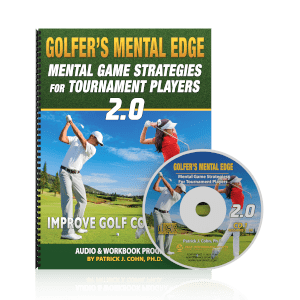
Avoid Overthinking Your Swing
What is the biggest challenge you face on the golf course?
Golf is considered one of the most technically challenging sports. Golfers have many variables to take into consideration for each shot: club choice, weather conditions, distance from the hole, course conditions, etc.
Each shot requires sound mechanics but overthinking your swing can lead to technical overload. Focusing on the minute details of each swing, over-analyzing and second-guessing each shot can lead to disastrous results.
Golf is not merely a physical and technical game. Golf is a mental game, and the mental aspects of golf are by far the most challenging.
A golfer from our Golf Mental Game Survey asked the following question regarding specific challenges she faces when golfing:
“How do I reduce tension, trust my ability, swing freely and shoot better scores more consistently?”
Most golfers can relate to this question. You start the round feeling anxious. You grip the club tighter. You can feel the tenseness in your forearms, shoulders and neck.
Your mind is racing a thousand miles per hour and you try to power through your swing. Some of your shots are good while others are really bad. You have no idea what to expect from each swing.
Your question may sound like three separate issues:
- Reduce physical tension
- Trust ability & Swing freely
- Improve consistency
In reality, those three factors can be reduced to one issue: How can I play golf more intuitively?
Intuitive Golf Means You Are Attuned Mentally and Physically.
- You are immersed in the moment with minimal distractions.
- You have just enough tension to produce a powerful and efficient stroke.
- You trust preparation and ability to perform under pressure.
- You feel confident that you can transfer your practice swing to competitive rounds.
- You have consistent mechanics that produce consistent results.
Intuitive golf is a combination of poise, focus, trust and objective calmness.
These mental skills are what are referred to as having a high golf IQ.
A high golf IQ frees your mind and body to see the current shot and select the best strategy for that shot given the conditions at that moment. In this scenario, it is just you and your shot, nothing else.
Intuitive golf takes time and patience, but you must put in the mental work.
Xander Schauffele understands the importance of putting in the mental work. Heading into the 2021 Farmers Insurance Open, Schauffele knows he hasn’t fared well at Torrey Pines.
In five starts at Torrey Pines, Schauffele has missed the cut four times and tied for 25th in 2019. In 12 rounds at Torrey Pines, Schauffelle has only broken par five times.
Schauffele’s goal for the Open is to find his way back to playing intuitively.
SCHAUFFELE: “I’m aware Torrey Pines has not been a place that’s been too kind to me even though I love playing here. I’ve been playing a lot just trying to get back into sort of what I like to call getting my golf IQ back, sort of making things easy on myself mentally when I play, so the last week I’ve been playing a lot.”
Mechanics and physical strength take you only so far. It is a strong mental game that pushes you over the hump and towards your potential.
How to Raise Your Golf IQ:
One strategy to raise your golf IQ is to learn to play the game intuitively.
Intuitive golf demands that you give your full attention to improve your game mentally and technically through practice. Practice your golf swing for consistency, not perfection.
Don’t just go through the motions when you practice. Each training and practice session should have a purpose.
When you train and practice with purpose, you gain trust in your game. Trust is an essential element of intuitive golf and helps you compete without overthinking every shot during competitive rounds.
Keep it simple when you play golf by having only one swing cue or trigger.
Related Golf Psychology Articles
- Subscribe to The Golf Psychology Podcast on iTunes
- Subscribe to The Golf Psychology Podcast on Spotify
Golfer’s Mental Edge 2.0

Do you suffer from fragile self-confidence after missed hitting shots or making mistakes, playing with strict or high expectations that undermine confidence, or the inability to play freely and relaxed on the course?
Successful golfers have learned how to perform with ultimate confidence in competition, so we’ve developed The Golfer’s Mental Edge 2.0 Workbook and Audio program to help you do this!
The Golfer’s Mental Edge 2.0 program includes the top 11 mental training sessions I do with my personal students to help them boost their mental game and improve consistency on the course!